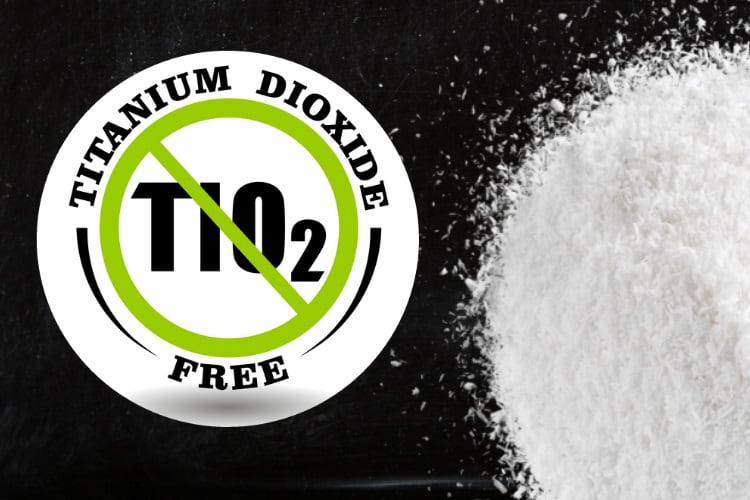The inorganic compound in powder form is used to make food more visually appealing, to give colour to products that would otherwise be colourless, confers a bright white shade, or to restore its original appearance.
It is widely used in baked goods, creamers, sandwich spreads, processed nut products, soups, broths, sauces and salads. In the US, although there are some safety concerns, the FDA generally recognises titanium dioxide as safe (GRAS).
It is also used in cosmetics, paints and porcelain enamels.
The new rule
TiO2 is a naturally occurring oxide of titanium that is odourless and absorbent. However, following a request by the European Commission in March 2020 to re-evaluate food colours approved for use before 2009, the European Food Safety Authority (EFSA) ruled that titanium dioxide is no longer considered safe when used as a food additive.
The main concern centres around its potential genotoxicity – that is, its ability to damage genetic material in human cells. In fact, France banned the use of E171 from 1 January 2020, following scientific evidence that it may cause cancer.
EFSA’s assessment followed a rigorous methodology and took into consideration thousands of studies that have become available since its previous assessment in 2016. The scientific experts also applied, for the first time, the 2018 EFSA Scientific Committee Guidance on Nanotechnology and found that E171 contains (at most) 50% of particles in the nano range (ie. less than 100 nanometres) to which consumers may be exposed.
Prof Maged Younes, chair of EFSA’s expert Panel on Food Additives and Flavourings (FAF), said, “Taking into account all available scientific studies and data, the Panel concluded that titanium dioxide can no longer be considered safe as a food additive.
“A critical element in reaching this conclusion is that we could not exclude genotoxicity concerns after consumption of titanium dioxide particles. After oral ingestion, the absorption of titanium dioxide particles is low, however they can accumulate in the body.”
While it could did not confirm a concrete genotoxic effect, EFSA concluded it did not have sufficient data to calculate a safe daily intake. This means an Acceptable Daily Intake (ADI) cannot be established for E171.
Prof Matthew Wright, both a member of the FAF Panel and chair of EFSA’s working group on E 171, added, “Although the evidence for general toxic effects was not conclusive, on the basis of the new data and strengthened methods we could not rule out a concern for genotoxicity and consequently we could not establish a safe level for daily intake of the food additive.”
EU's food additive labelling laws
Food additives are substances are not normally consumed as a food in itself, but added to serve a specific function.
In the EU, a food additive must be identified as an ingredient with its E-number clearly listed on pack, along with information about its function (for example, preservative, sweetener, antioxidant).
The EU recognises 22 different categories of food additives, each with a separate chemical make-up and function.
For example, sweeteners are used to add sweetness, often at lower-calories; antioxidants are used to prolong the shelf-life of foods by protecting against oxidation; anti-caking agents stop powdered or granulated foods (such as flours) from sticking to one another; and emulsifiers help water and oils remain mixed together in an emulsion for longer.
In the EU, food additives are regulated under Regulation (EC) No 1333/2008. The European Food Safety Authority’s (EFSA) FAF Panel is responsible for reviewing data to assess safety.
It reviews physical and chemical information about the substance, data on all types of toxicity (including short- and long-term toxicity, reproductive toxicity, genotoxicity and carcinogenicity), and data on exposure levels to consumers. It also calls for submissions of new data to fill in gaps to draw an informed conclusion.
Based on EFSA’s risk assessment, the European Commission, member states and the European Parliament make the decision on whether an additive can be used in Europe and set safe consumption levels.
EFSA is also responsible for the periodic re-evaluation of food additives that have been approved for use in the past.





